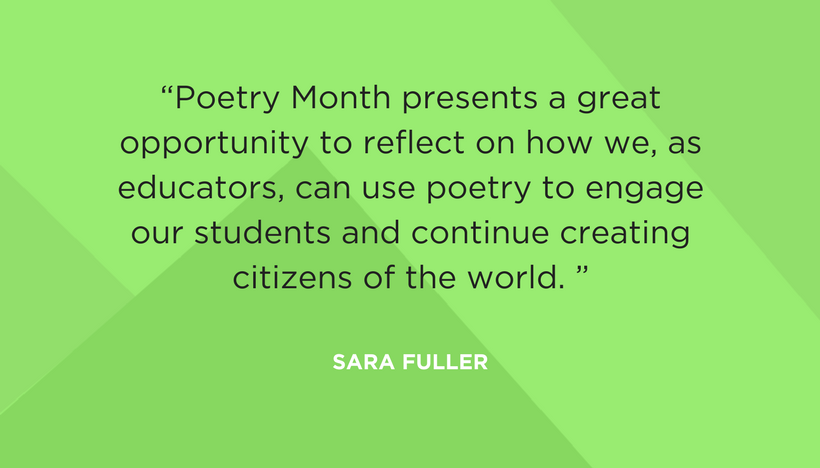This post was contributed by guest writer Sara Fuller, as part of an ongoing series presented by NCTE’s Standing Committee on Global Citizenship.
“Poetry is empowering. It can show students how people express themselves, push them to consider their own identities, and inspire them to seek social change. Through this, students gain valuable insight into the human experience. In writing their own poetry about their struggles, experiences, and desires, students are doing important work in analyzing their identities and critiquing their places in society” (Burr, 2017).
Jaclyn Burr’s article, “Springsteen, Spoken Word, and Social Justice: Engaging Students in Activism Through Songs and Poetry,” in the NCTE English Journal from this past July clearly explains the importance of including poetry in our social justice and citizenship teaching.
As April is Poetry Month, it presents a great opportunity to reflect on how we, as educators, can use poetry to engage our students and continue creating citizens of the world.
There are many ways to do this within our classrooms. Analyzing the lyrics of protest music is one way, as Michael Gonchar and Katherine Schulten explain in their lesson on the New York Times Learning Network: “Studying the protest music of the past or present can be a powerful and engaging teaching tool for students, whether the goal is to better understand a historical time period, analyze the power of lyrics and poetry, understand forces of social change or respond to current issues.” The complete lesson on teaching with protest music includes videos, audio files, discussion questions, writing prompts and more. They also link to many other resources, including resources from the Rock n Roll Hall of Fame.
We can also look at spoken word poetry and how it is being utilized by activists to tell their stories. On the TakingITGlobal website you can find a complete lesson plan on Poetry as Art and Activism.
Another, perhaps more traditional, approach would be to do a close read of a poem such as “Still I Rise” by Maya Angelou. Teaching Tolerance provides a lesson plan for middle and high school students where learners examine how Angelou used her voice for change.
Regardless of the approach you take, I encourage you to make these lessons your own. Find lessons that speak to your students and poems that respond to what is important in your community.
Works Cited
Burr, J. C. (2017). Springsteen, spoken word, and social justice: Engaging students in activism through songs and poetry. English Journal, 106(6), 61–66.

Sara Fuller is an Assistant Professor of English at Cuyahoga Community College and is a former 7–12 ELA teacher. She blogs at www.msfsteachingadventures.com.

